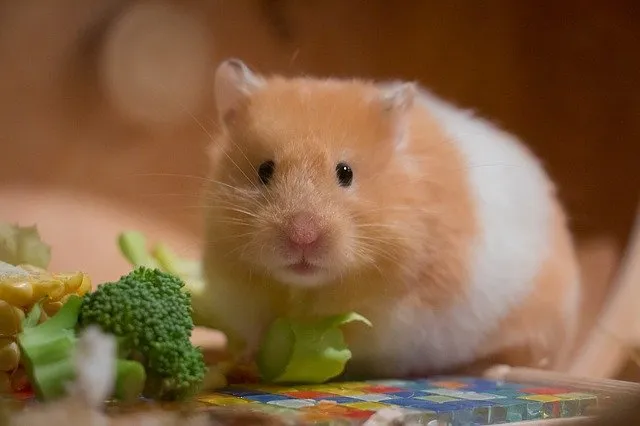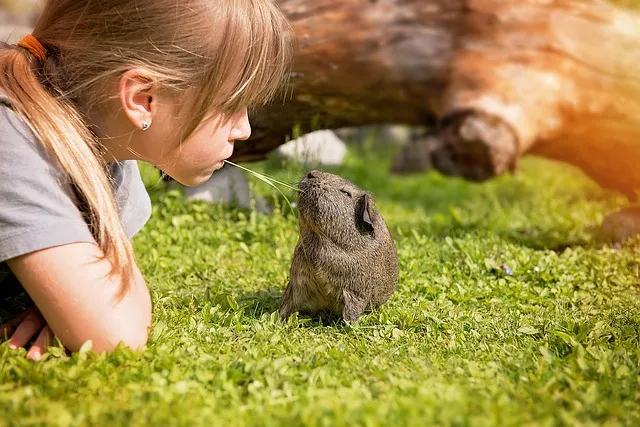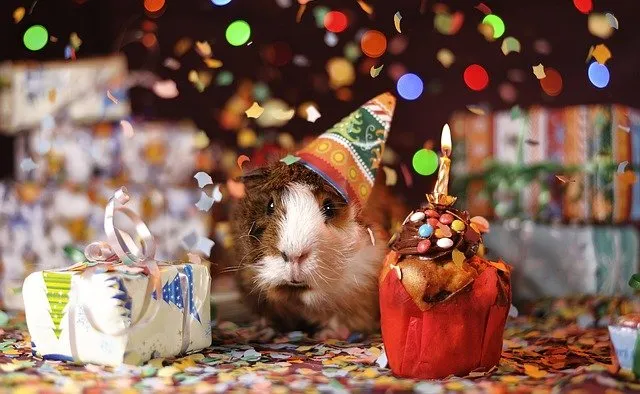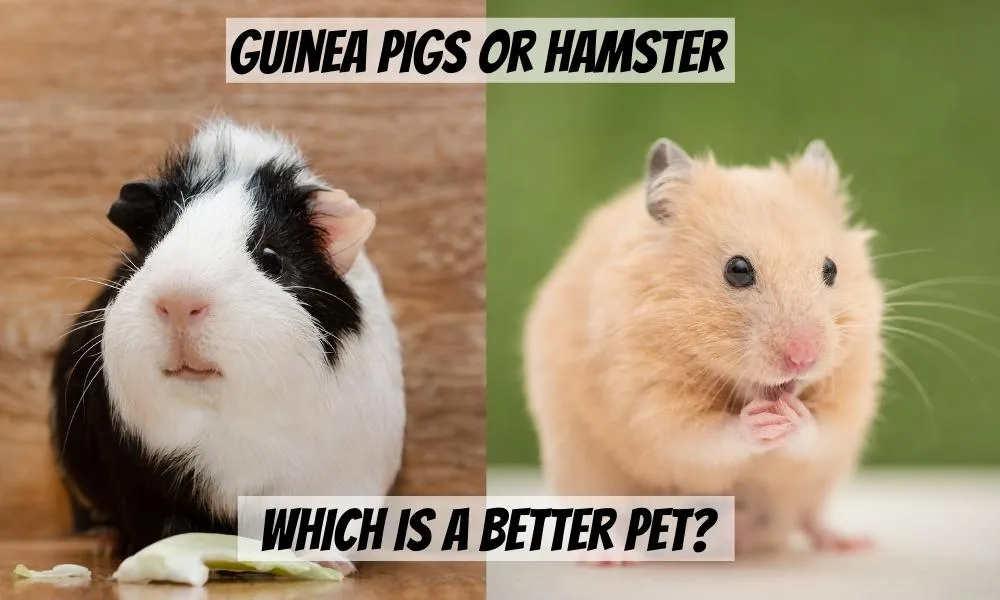Both guinea pigs and hamsters are great pets to have at your home. They are highly similar in appearance yet have several different features.
So between guinea pigs or hamsters – which is a better pet?
Guinea pigs are better pets in terms of friendliness and child safety. On the other hand, hamsters are more ideal pets in terms of size and cleanliness.
A clear understanding of the difference between the two will help you decide which is a better pet for you.
But If I were to choose between the two, I prefer guinea pigs.
If you’re wondering why I said that, let’s compare them in 9 different categories!
Read further below to learn more…
Table of Contents
Guinea Pig VS Hamsters (Comparison)
Summary
| Category | Guinea Pigs | Hamsters | Winner |
| Size | 2-4 lbs for adults | 0.8-3.5 oz for adults | Hamsters |
| Housing | Indoor or outdoor (needs bigger cage) | Strictly indoor | Guinea pigs |
| Food | Herbivores | Omnivores | Hamsters |
| Friendliness | Sociable & friendly | Solitary animals | Guinea Pigs |
| Child Safety | Gentle & child friendly | Not child-friendly | Guinea pigs |
| Grooming | Needs less grooming | Needs more grooming | Guinea Pigs |
| Sanitation (Poop and Pee) | Poop & pee more | Poop & pee less | Hamsters |
| Life Expectancy | 5-8 years | 2-3 years | Guinea Pigs |
| Sleeping Routine | Diurnal | Nocturnal | Guinea Pigs |
Size

As summarized earlier, guinea pigs are larger in size than hamsters by three to four times. While the guinea pigs weigh about 2-4 lbs (32-64 oz), the hamsters have a weight of 0.5-8 oz (0.03-0.5 lbs).
If we consider a food analogy for comparison, we might consider guinea pigs similar to the size of a spud and hamsters similar to a strawberry.
It clearly shows that guinea pigs require a bigger area to move around and more food to sustain themselves. It is also clear that having a guinea pig means cleaning bigger areas.
The Winner: Hamsters
Hamsters being smaller in size, are better as tiny pets. They take up less space and eat less. Owning a hamster means less space to clean and less work.
Housing
Guinea pigs being larger in size, require bigger cages. But these animals can stay both indoors and outdoors.
So, if you don’t have enough space inside your house, you can keep your cavy’s cage in the garden. However, you need to make sure that their cages have enough room for them to play around.
Hamsters, on the other hand, require much less space.
You can keep them in small cages inside your house. But they are strictly indoor animals.
The Winner: Guinea pigs
Even if guinea pigs take up more space, you can always keep them outside your house if there is a space crunch indoors. But you have to keep your hamsters inside your house.
Food

One of the biggest differences between guinea pigs and hamsters is their food habit.
While guinea pigs are herbivores or purely vegetarian in nature, hamsters are omnivores. This means they can survive on both veggies and meat.
Not all pet owners are aware of this fact, but you can even feed items like mealworms to your pet hamster!
However, when it comes to feeding your guinea pigs, you have to prepare a vegetable meal for them. You will also need to stack an unlimited quantity of Timothy hay for cavies to munch on.
Also, you must remember guinea pigs eat a lot more than hamsters owing to their size.
Read Also: Are Guinea Pigs Herbivores, Carnivores, or Omnivores?
The Winner: Hamsters
No wonder having a hamster is a lot easier when it comes to feeding your pet. They eat both plants and animal-based diets.
You don’t need to worry about keeping enough hay for their munching. Plus, they eat a lesser amount of food every day.
Friendliness
Guinea pigs are sociable and friendly animals. It is the perfect pet for you if you have other pets at home.
They are friendly towards other animals and cohabit without trouble. They actually survive better and grow if you have two or more guinea pigs together in a cage.
Hamsters, on the other hand, are solitary animals. Hamsters tend to become hostile when you keep them with other animals in your house.
The sizes and fragility of hamsters are probably reasons behind such a non-friendly attitude.
The Winner: Guinea Pigs
When it comes to friendliness, guinea pigs are a better choice of pet for your house as compared to solitary hamsters.
Child-Safety

We already know that hamsters are unfriendly and solitary animals. They, being highly temperamental, often tend to bite or nip when you touch them.
They owe such an attitude to their small size and fragile physical condition.
Guinea pigs, on the other hand, are very friendly and cuddly animals. They make a perfect companion for your children.
So, if you have a child at your house, a guinea pig is a safer option for you.
The Winner: Guinea Pigs
Guinea pigs are much safer for your children as compared to hamsters. They are friendly and less fragile. Your child can handle them at ease.
Grooming
As we discuss the grooming of guinea pigs and hamsters, it is best to state that both the animals don’t require too much grooming like dogs.
Both guinea pigs and hamsters self-groom themselves at least once a day.
However, hamsters are more smelly than guinea pigs. So, even if you are not grooming them daily, you need to wash your hamster at least once a month.
Guinea pigs, on the other hand, require less bathing. A bath in warm water once every two months is enough for your cavy.
But grooming is an important part of pet care. So, you should brush both your guinea pigs and hamsters once or twice a week to avoid clumps and matting of the fur. It also protects them from lice or fleas.
The Winner: Guinea pigs
Keeping a guinea pig as a pet is no wonder much easier. They are low maintenance and self-grooming in nature.
Read Also: Do Guinea Pigs Clean Themselves?
Sanitation (Poop and Pee)
Are you worried about sanitation and hygiene while keeping a pet? Understand how frequent they poop or pee to know how much cleaning they require
A healthy adult guinea pig lays about 100 dropping in a day. As they eat more than hamsters, it is natural that they poop more often.
Guinea pigs with a healthy renal system will pee every 15 minutes (about 96 times a day). However, the amount and number of times they pee depend on their daily lifestyle and diet.
Clearly, having a guinea pig involves a lot of cleaning for the owner.
Hamsters, on the other hand, poop about 16-25 times a day (once in every hour, and pee about 3-5 times a day). Some studies also show that hamsters pee about 7ml per day.
Needless to say, it is easier to maintain sanitation and hygiene if you have a hamster.
The Winner: Hamsters
Hamsters pee and poop a lesser number of times in a day than guinea pigs. Therefore, maintaining sanitation and owning hamsters is easier than keeping guinea pigs as a pet.
Life Expectancy
When you keep a pet, you want it to survive longer or remain as your companion for a longer time.
While guinea pigs have a life expectancy of about 5-8 years, hamsters survive for only 2-3 years. Naturally, having a guinea pig as a pet is a preferable option.
The Winner: Guinea Pigs
Guinea pigs live longer than hamsters. Furthermore, they are friendly.
Read Also:- How long do guinea pigs live on average?
Sleeping Routine
Guinea pigs are mostly diurnal animals like us. They stay awake during the day and sleep at night.
It means you get to enjoy all their activities throughout the day.
Hamsters, however, are nocturnal animals. So, most of their activities happen at night when everyone else is sleeping.
If you plan to wake your hamster during the daytime and enjoy some activity, be prepared for a grumpy hamster. You are even likely to get an unpleasant bite.
Read Also: Are Guinea Pigs Nocturnal Animals? (No! – Here’s Why)
The Winner: Guinea pigs
Unless you are a night person, guinea pigs are the best companion for human beings. Like us, they stay awake throughout the day and tend to return your affection.
The Overall Winner

GUINEA PIGS won the overall battle against hamsters!
Though both cavies and hamsters are adorable, comparing the two to decide on a pet was extremely difficult.
However, after thoroughly comparing them, you see that guinea pigs got the upper hand in 6 categories and hamsters in 3.
So, considering housing, friendliness, child safety, grooming, life expectancy, and sleeping routine, guinea pigs have taken the lead.
However, hamsters are a better choice if you are looking for a smaller pet with better sanitation.
With these comparisons, you can easily say that guinea pigs are the ultimate winner in the battle against hamsters.
They are sociable and child-friendly animals that require less grooming, live longer as companions, and entertain us throughout the day.
Related Questions:
Which is Cheaper: A Hamster or a Guinea Pig?
When budget is concerned, a hamster is a cheaper option.
If you are planning to buy either a hamster or a guinea pig, the cost of each is usually the same, about $10-$25 per animal.
However, it is the cost of maintenance that is higher for guinea pigs.
The cost of keeping a guinea pig is more as they live longer, eat more, and require bigger cages and frequent cleaning. Plus, they need a lot more toys for their activities.
The cost doesn’t end here. Since guinea pigs do better in a pair or when there is more than one, you will need to buy more than one guinea pig. Naturally, the cost increases.
Getting guinea pigs as a pet can result in an annual expense of about $650.
Hamsters, on the other hand, are less expensive. They neither require bigger cages nor do they eat a lot of food.
Though you spend more on their grooming, the overhead expense is less. Moreover, they don’t need a companion for better living as they are solitary in nature.
So, if you have a budget in mind, hamsters are a cheaper option.
What Smells Worse: Hamsters or Guinea Pigs?
Though both the animals self-groom themselves, hamsters smell worse.
If you are not maintaining proper hygiene in the cage, a hamster’s cage is likely to smell a lot more than that of a guinea pig as their urine stinks more.
Final Thoughts
In this article, we have learned that guinea pigs are better pets than hamsters.
Having a guinea pig as your pet means you will have a companion for a longer span of time, enjoy their activities throughout the day, and keep them with other animals in your house.
Guinea pigs are highly sociable and friendly. They make a better pet if you have a small child at your home.
While hamsters are solitary, nocturnal animals who like to stay on their own and tend to bite on the slightest agitation.
However, guinea pigs being bigger in size, require more space and food. Needless to say, they are more expensive than hamsters.
Though guinea pigs require less grooming than hamsters, it is easier to maintain sanitation and hygiene with hamsters as your pet.
But overall, I would say that guinea pigs are better as pets than owning hamsters.
If you find this article helpful to get your next pet, share it with your friends!
